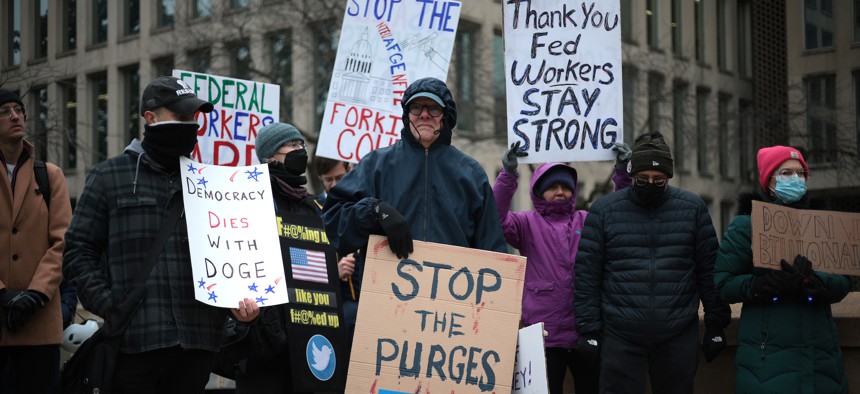
Dozens of Museum Agency Employees Placed on Leave During Trump Administration Restructuring Effort

Title: Dismantling Cultural Support: Understanding the Trump Administration’s Move Against the IMLS
In a move that has sent shockwaves through the cultural community, the Institute of Museum and Library Services (IMLS), a pivotal federal agency supporting libraries and museums across the United States, has become the latest target of the Trump administration’s aggressive restructuring efforts. Following a recent executive order, a sweeping administrative leave was issued to the majority of the agency’s staff, raising serious concerns about the future of federal support for vital cultural and educational institutions.
What is the IMLS?
The Institute of Museum and Library Services was established in 1996 and stands as the primary source of federal support for libraries and museums in the United States. Although relatively small in terms of budget — receiving $294.8 million in the 2024 fiscal year, which constitutes less than 0.005% of the federal budget — its impact is far-reaching. In 2024 alone, the agency distributed over $266 million in funding to support educational programming, collections management, digital initiatives, and community outreach efforts by museums, libraries, and archives.
Why the Sudden Disruption?
On March 31, 2025, a sudden directive was issued by the Trump administration’s Department of Government Efficiency (DOGE), effectively placing nearly 80% of the IMLS’s 77 employees on administrative leave. According to the American Federation of Government Employees (AFGE) Local 3403, the union representing IMLS staff since 2022, the shutdown encompasses the entire staff. Employees were informed during a brief meeting and were subsequently locked out of their emails and directed to return all government-owned equipment.
Administrative officials state that the restructuring aims to redirect taxpayer funding away from programs they claim promote “discriminatory DEI initiatives” and “anti-American programming.” This rationale aligns with the administration’s broader campaign to dismantle Diversity, Equity, Inclusion, and Accessibility (DEIA) efforts across multiple federal and cultural institutions.
Implications for Libraries and Museums
The ripple effects of this abrupt administrative action are poised to be severe and far-reaching:
1. Halted Grant Processing:
All processing of 2025 IMLS grant applications has been suspended, leaving many cultural institutions — including those in underserved rural and urban communities — in limbo. These grants are often the financial lifeline for smaller organizations, supporting everything from technology upgrades to staff hiring and special exhibitions.
2. Grant Terminations:
Although the fate of previously approved funding remains undetermined, the union has indicated that many of these grants are now likely to be terminated, disrupting planned programming and potentially leading to layoffs at recipient institutions.
3. Communication Blackout:
Staff are not permitted to communicate with grant recipients or the public regarding the restructuring. This loss of direct communication means organizations have no immediate access to guidance or updates on federal funding, further clouding their operational future.
Leadership Changes Backing the Effort
In tandem with the restructuring, President Trump appointed Keith E. Sonderling, current Deputy Secretary of Labor, as the acting director of IMLS. This appointment followed the directive to eliminate all “non-statutory functions and components” of the agency. Sonderling’s role suggests a continued reshaping of the IMLS’s mission towards ideologically driven ends.
Wider Cultural and Political Context
The dismantling of the IMLS follows a pattern seen across several other federal cultural bodies. In recent weeks, executive orders targeting so-called “race-centered ideology” have impacted the Smithsonian Institution, and DEIA programs at the National Gallery of Art were similarly dissolved.
These actions reflect the administration’s ongoing effort to reframe federal cultural funding as a tool for promoting patriotic, traditionalist values — often at the cost of diversity, historical accuracy, and inclusive representation.
Response from Cultural Leaders
The American Alliance of Museums (AAM) and the American Library Association (ALA) have both issued strong statements condemning the staff terminations and calling attention to the grave consequences for institutions reliant on IMLS support. The AAM encouraged impacted organizations to inform their congressional representatives about funding disruptions.
Looking Ahead: What Comes Next?
As the fallout continues, institutions and advocacy groups are organizing to resist the dismantlement. Legal challenges may arise, and bipartisan concern is also building in Congress, particularly among legislators with large rural constituencies that rely heavily on federal support for educational and cultural infrastructure.
For now, cultural organizations are urging transparency and advocating for continued public funding to maintain their essential services for learning, preservation, and community engagement.
Conclusion
The Trump administration’s effort to dismantle the IMLS not only threatens the operational stability of countless museums and libraries but also jeopardizes a foundational belief that cultural knowledge and literacy are core to democracy. As debates over the agency’s future unfold, the need for public engagement and legislative oversight will play a crucial role in determining whether this vital institution can survive the political turbulence and continue serving the American public.
Supporters of cultural heritage and access to knowledge are encouraged to stay informed